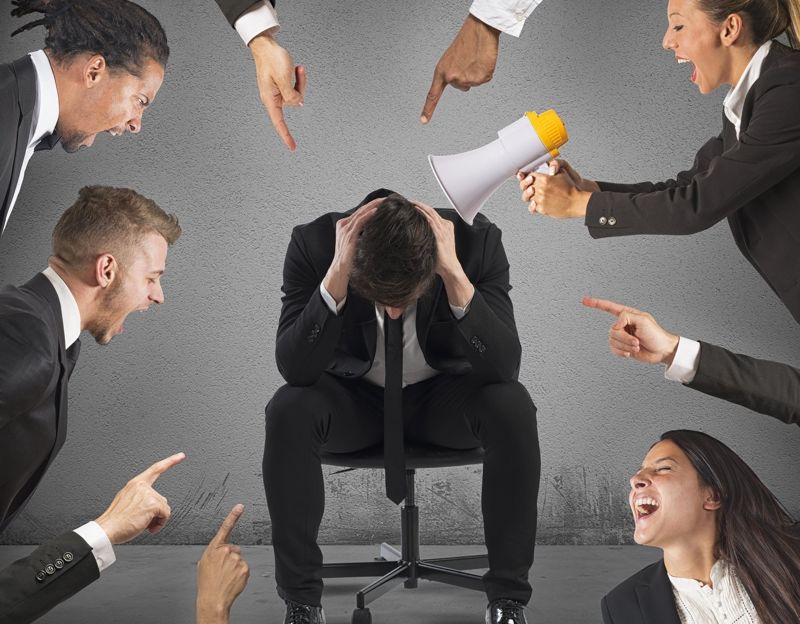
The physical scars might fade, but the mental scars caused by bullying can last for decades. If you are a victim of bullying, knowing that your tormentor belongs in a specific category may be no comfort. However, for researchers, it’s a different story. Identifying the precise characteristics of types of bullies can help them to understand why they bully and how they stop. So, can anyone become a bully?
I’d like to think that I’m a reasonable kind of person, but I was accused of bullying the other week. I was having a debate about the current political situation in the UK. A little background before I carry on – I feel very passionately about the result of our recent referendum. I’m interested in politics, I vote in every election and I am a card-carrying member of a political party.
My friend and I were out walking our dogs and we came across another couple who I knew from past conversations had voted a different way to me. They started the conversation about the vote and I reacted in my usual passionate way. I used terms I knew the couple wouldn’t know and pressed them repeatedly to answer my questions. They couldn’t and I ‘won’ the debate. But I didn’t change their minds, which is what I really wanted to do.
Afterwards, my friend asked if I was happy. Yes of course I was. I demolished them. They looked stupid and I won and I told her so. “You were arrogant and you bullied them“, she told me. Whoa, what? Me? A bully? I was shocked. But after I calmed down, it got me thinking.
Can there be different types of bullies? I researched the subject and was shocked by what I found. Basically, the answer is yes. Worryingly, I might fit into one of the types of bullies.
Most of us imagine that your typical bully is someone with low self-esteem, poor social skills, and no friends who had a rotten childhood. This is certainly true of a lot of bullies.
However, research suggests this is not the whole story. There is another type of bully. Surprisingly, it is the polar opposite. Rather than your archetypal social misfit who bullies because they feel inferior to everyone else, this bully is at the top of the social tree. They are ‘pure bullies’.
Moreover, they don’t feel inferior at all. In fact, they bully because they feel superior to everyone else. They’ll take on the dominant role in order to enhance their social position. These types of bullies manipulate and harass others to raise their status.
Sound familiar? I was horrified. Was this really me? Before I explored this type further, I wanted to see if there were any more types of bullies. Not only that but what are the hidden causes behind this behavior?
As the name suggests, this bully is all about strength and brute force. They are not likely to have the intellectual nous to be able to bully their victims. Consequently, they’ll use muscle power to do the bullying.
Some bullies are not in your face and violent in a physical way. Yet, they can cause just as much harm by their actions. These types of bullies use gaslighting behaviors like sending mixed messages, silent treatment, sulking, or blaming you for their problems.
Unlike the passive-aggressive bully, the blunt bully doesn’t do anything in an ambiguous manner. Their words are weapons of war.
Sticks and stones might not break any bones, but gossip behind people’s backs can ruin lives. This is a particularly insidious type of bully. The one that spreads malicious rumours or untruths about another person.
This type of bully is relatively new but no less dangerous or traumatic. Most people have access to the internet and that’s what makes cyberbullying so damaging, it never stops. Trolling or keyboard warriors might be new terms but we shouldn’t underestimate the harm they can do.
One of my first memories at primary school was of observing a group of girls bullying another school girl. Even at that young age, I knew it was wrong, but, I also knew that I didn’t want to be bullied so I said nothing. Unfortunately, not getting involved is a typical reaction.
The workplace bully is becoming more and more commonplace. People that abuse their authority and positions of power to undermine co-workers. It is important to remember that we spend an awful lot of time at work so the effects of bullying at work can have devastating consequences.
Recent research shows that popular children are more likely to bully their peers, rather than troubled students. Students near the top of the social hierarchy at school were more likely to bully other students.
“I think a lot of kids think this is one way to gain or maintain social status. The more kids care about being popular, the more aggressive they are.” UC Davis Sociology Co-author Professor Robert Faris
Bullying is a complex issue. As such, there are many different reasons why a person would resort to this sort of behavior.
Does it help to know there are different types of bullies? I can only speak from my own experience. It was an eye-opener to be a) branded a bully and b) recognise the type of bully I actually was.
How has this helped? I understand that my way of debating can be seen as bullying and aggressive. But from a personal note, I realise that I was trying to feel superior to everyone else. Perhaps in the future, I should try being more open-minded instead of forcing my opinions on others.
References:
View Comments
I don't have to bully anybody. I just keep track of the growing number of mass shootings and watch karma unfold.
Very good message fos us.